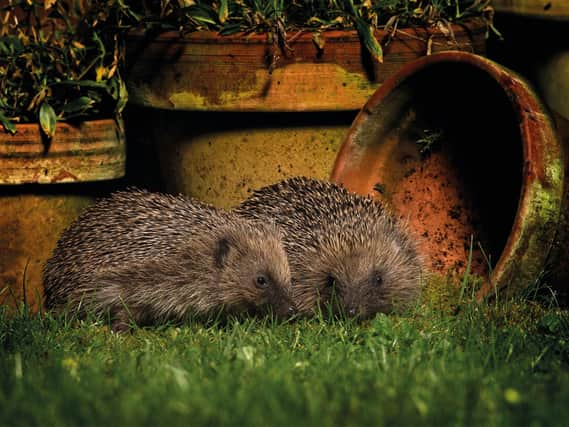Wildlife needs our help through winter and here is how we can help says the Yorkshire Wildlife Trust


As we begin another month of lockdown, take a moment to look back to your garden, your balcony, your lawn or even local park or green space. It probably seems a lot quieter, and a fair bit bleaker than several months ago. But winter isn’t just hard for us. It can also be challenging for wildlife.
Many birds migrate south to warmer climes during our cold winter, but many others stay behind.
Advertisement
Hide AdAdvertisement
Hide AdMany mammals hunker down somewhere warm and dry and hibernate or go into torpor, but that too is its own gamble. It relies on them having found enough food pre-hibernation to see them through, and they also have to hope that the spot they have chosen remains undisturbed until spring.
Wildlife needs assistance to get through this winter and there are also lots of relatively small things you can do to help. These coming months will be hard for them, and by leaving out a little food, water and shelter you can easily turn your outside space into a precious pit stop for weary wildlife.
Birds
When the weather starts to chill, many birds begin to leave the UK to fly south for the winter. Swifts, swallows, martins, warblers, cuckoos, nightjars, ospreys and turtledoves all take flight and don’t return until spring. But bird numbers don’t dip hugely as we also receive a large number of migrants from even colder places like Russia and Scandinavia. Fieldfares, redwings, bramblings, Bewick’s and whooper swans along with many kinds of ducks, geese and wading birds all begin to arrive in autumn and stay until spring.
This is why our wetland nature reserves are such wonderful places to visit in winter as they are full of the sights and sounds of hundreds of swans, geese, ducks and waders.
Advertisement
Hide AdAdvertisement
Hide AdMost garden and farmland birds stay in the UK throughout winter, and these are the ones that you can give a helping hand, including the most iconic winter bird – the robin.
Because robins are so synonymous with Christmas, many people think that’s the only time they’re here. But you can find robins in the UK all year round – you’re just more likely to notice them in winter, as they are one of the first birds to start singing and their bright plumage makes them easy to spot in the bare trees.
Starlings too are year-long residents, and this is the perfect time to catch their mesmerising murmurations as they swoop around the twilight skies in huge numbers.
One of the easiest ways to help is to put up a bird feeder or two. You can pick these up in supermarkets, or order online from the YWT shop.
Advertisement
Hide AdAdvertisement
Hide AdRemember these three golden rules: 1) fat is good, but remember to keep it balanced – your birds will need to gain weight but not too much 2) squirrel-proof to stop them pilfering all the food. And lastly, hygiene is important. Use will likely be high and disease can be transmitted quickly between birds without regularly changing food and cleaning your feeders (every few weeks is recommended).
Hedgehogs
If you are playing host to a visiting hedgehog, then count yourself lucky! Though hedgehogs are the UK’s favourite mammal, fewer and fewer people are seeing them regularly, if at all.
Around a third of the British hedgehog population has been lost since the Millennium, marking them as a species of highest conservation concern. They are listed on the International Union for Conservation of Nature as vulnerable and are in the same category as polar bears.
From November onwards, hedgehogs start to hibernate. They will build nests in old rabbit burrows, piles of brushwood, compost heaps, perhaps even under your shed. Keep an eye out for their nests during winter gardening, and any bonfires. Consider installing a hedgehog hibernaculum – you can buy one or make one yourself. For more advice go to ywt.org.uk/hedgehogs.
Amphibians
Advertisement
Hide AdAdvertisement
Hide AdAmphibians (frogs, toads and newts) also hunker down for winter although they are not technically hibernating.
Their metabolism is lowered by the drop in temperature, so their response is passive (called brumation), whereas mammals that hibernate actively lower their metabolism when winter arrives. Frogs are likely to stay at the bottom of ponds – if they are deep enough.
This is a risky business; as leaf mould breaks down it releases gasses into the water – if the pond freezes over, the gasses can build up to toxic levels, so try to keep your pond ice free.
Garden oases
Our gardens make up more of the UK’s green space than all the nature reserves combined (an area the size of Suffolk) so if every garden, lawn, patio and balcony was revolutionised into a wildlife sanctuary, it would be transformative for wildlife. Whatever your outside space, you have the power to help wildlife this winter and beyond.
Advertisement
Hide AdAdvertisement
Hide AdSupport The Yorkshire Post and become a subscriber today. Your subscription will help us to continue to bring quality news to the people of Yorkshire. In return, you'll see fewer ads on site, get free access to our app and receive exclusive members-only offers. Click here to subscribe.Link to use: https://www.yorkshirepost.co.uk/subscriptions